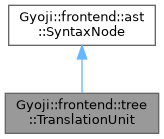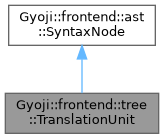Represents the top-level syntax unit for a source file. More...
#include <tree.hpp>
Inheritance diagram for Gyoji::frontend::tree::TranslationUnit:

Collaboration diagram for Gyoji::frontend::tree::TranslationUnit:

Public Member Functions | |
| ~TranslationUnit () | |
| const std::vector< Gyoji::owned< FileStatement > > & | get_statements () const |
 Public Member Functions inherited from Gyoji::frontend::ast::SyntaxNode Public Member Functions inherited from Gyoji::frontend::ast::SyntaxNode | |
| SyntaxNode (Gyoji::context::TokenID _type, specific_type_t _data, const Gyoji::context::SourceReference &_source_ref) | |
| const std::vector< std::reference_wrapper< const SyntaxNode > > & | get_children () const |
| const Gyoji::context::TokenID & | get_type () const |
| template<class T > | |
| bool | has_data () const |
| template<class T > | |
| const T & | get_data () const |
| const SyntaxNode & | get_syntax_node () const |
| const Gyoji::context::SourceReference & | get_source_ref () const |
Detailed Description
Represents the top-level syntax unit for a source file.
This class represents a translation unit, the top-level result of parsing a source-file. A translation unit normally corresponds to a unit that will ultimately be compiled into a binary object file (.o) and linked later into an executable.
A translation unit consists of zero or more file-level statements that represent the file's content. At this level, the statements may be one of:
- Type Definition
- Enum defintion
- Class definition
- Function definition
- Global variable definition
- Function forward declaration;
- Namespace definition (possibly containing more statements inside them).
- Using (as) declaration.
All syntax information about the file appears in a tree-like structure beneath this node.
Constructor & Destructor Documentation
◆ ~TranslationUnit()
| TranslationUnit::~TranslationUnit | ( | ) |
Destructor, nothing special.
Member Function Documentation
◆ get_statements()
| const std::vector< Gyoji::owned< FileStatement > > & TranslationUnit::get_statements | ( | ) | const |
This method returns a list of 'const' owned pointers to the statements defined in this translation unit.
The documentation for this class was generated from the following files:
- /home/jona/NetBeansProjects/jos/compiler/jlang2/src/frontend/gyoji-frontend/tree.hpp
- /home/jona/NetBeansProjects/jos/compiler/jlang2/src/frontend/tree.cpp